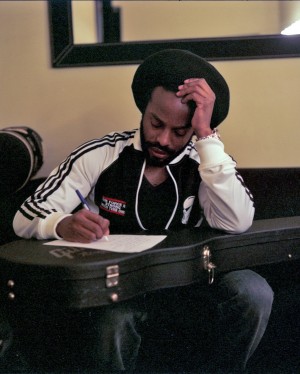‘The Russian Winter’ an Unlikely Journey
When watching the 94-minute Petter Ringbom documentary The Russian Winter, the viewer is left with a singular question: why has it taken so long to make a movie about John Forté? The musician’s life story certainly seems made for film: growing up on the mean streets of Brooklyn, New York, before attending one of the best prep schools in America (Phillips Exeter Academy), receiving a Grammy nomination for his work with the Fugees, spending seven years in prison for carrying $1.4 million in liquid cocaine before having his sentence commuted, and finally embarking on a tour across Russia.
The Russian Winter, playing until April 29 at the Tribeca Film Festival (which viewers can also take part in purely online), is essentially a documentary about Forté, but it has very little to do with the Fugees, jail, or growing up in Brooklyn. Instead, the film – which the 37-year-old founder of production company Le Castle co-produced – centers around Forté’s nine-week 2011 tour across Russia, a trip that he undertakes both to expand his musical horizons and to find himself.
In essence, the documentary tracks Forté as he collaborates with musicians across Russia and performs in various cities. The film begins in Moscow, where the American rapper is met by an adoring audience at Spaso House, the official residence of the American ambassador to Russia. Early on, the editing, despite The Russian Winter being the first full-length biopic by the Swedish-born director Ringbom, reflects the wonderment Forté experiences in his unfamiliar and exotic surroundings.
As much a personal journey as it is a musical one, Forté also comes face-to-face with culture shock. In a country where most people aren’t used to seeing someone of African descent with impressively large dreadlocks often swept up into a giant coil about his head, Forté’s mere presence is a striking contrast to the “blandness” one normally thinks of when thinking of Russia.
Yet, for all its wide-eyed wonderment, a distinct feeling of frustration also echoes throughout the film’s earlier bits. Virtually everything Forté does in Russia is preceded by Soviet-style bureaucratic hiccups. In one particularly moving scene, an aging bohemian rock critic explains to Forté why concert advertisements that he paid for were never put up, “You’ve been duped. It’s always this story with Russia, great culture, wonderful people, blah, blah — but it has always been criminally, badly managed.”
Though essentially about a recording artist and composer, the film is anything but a hagiography, and while chock-full of intimate musical sequences, it is not a concert film. Few of Forté’s songs and collaborations are heard in their entirety, with much of the documentary’s final footage focusing instead on Forté’s emotions throughout his tour.

Though very similar in style to another recent documentary about a musician (the Kevin Macdonald-directed Marley) The Russian Winter is able to maintain a degree of freshness through the fact that it is so multifaceted. Yet that polygonal side is also the film’s undoing.
Too often the viewer struggles to figure out Ringbom’s exact focus. Why, we wonder, are certain scenes included? Is the overall focus supposed to be on Forté’s music, culture shock in Russia, or on Forté’s quest for healing? Unfortunately, it is never really explained. Editing that only shows the “highlights” of Forté’s tour also means the viewer often has no frame of reference for why a particular scene is happening, ironically causing a level of emotional detachment from what is supposed to be a very emotional journey.
With the action of the film revolving completely around Forté, other characters come and go with little loss felt by the audience. One meets so many people in the music industry that it’s impossible to keep track of them all, anyway. But these interactions help shape Forté’s experience and the collaboration with other artists (particularly the viral Web hit “Wind Song” he makes with Ukrainian-born vocalist SunSay) are some of the documentary’s most powerful moments. Also particularly moving are the sequences of silence – a bold move considering the documentary is on the surface about music.
Despite hiccups, The Russian Winter is an introspective look at a journey not just about a man and his music, but growth and human interaction. As Forté, who performed at New York’s Bowery Ballroom on April 22 along with most of the artists he works with in the film, explains, “I’ve experienced more love here in two months than I feel I have in my own country in two years in being home from prison.” And though films of this type seem to pervade festivals like Tribeca in almost numbing amounts, it’s still worth checking out for those wishing to experience the uniqueness of a film featuring a rapper performing across Russia.
Rating: 4 out of 4
“The Russian Winter” will be on view online for free through April 29 as part of the Tribeca (Online) Film Festival. For more information visit the following Web site: http://www.tribecafilm.com/tribecaonline/.


